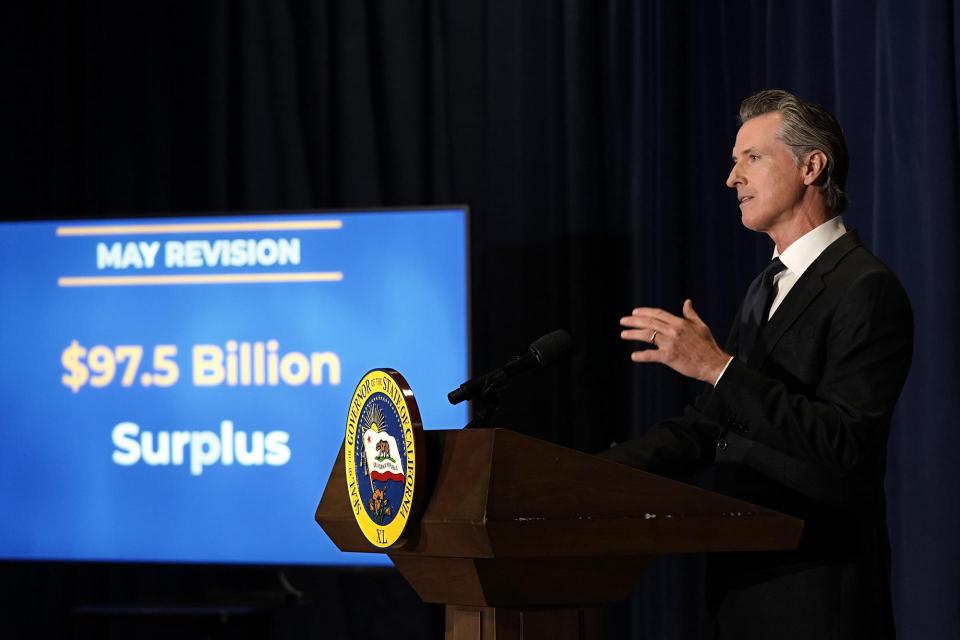Newsom keeps $200 million in ongoing funding for part-time faculty healthcare
Governor Newsom proposed significant increases for education and a 6.56% cost-of-living adjustment (COLA) in his revised proposal of the 2022-23 state budget released May 13. Education funding accounts for the majority of state budget expenditures, but the governor also proposes an inflation relief package and monies to combat housing insecurity.
With California’s robust economy and record revenues, Newsom funds Proposition 98 (which directs funding to state schools and community colleges) at $110 billion, which is $19.6 billion higher than the governor’s estimate in his January budget proposal.
For schools, the COLA applies to Prop 98 funds, including the Local Control Funding Formula and LCFF-excluded categorical programs. The May Revision continues and expands funding for initiatives like the Expanded Learning Opportunities Program and the rollout of Universal Transitional Kindergarten. Building on multi-year commitments, the governor’s largest new proposals earmark an additional $8 billion for discretionary expenditures, and $2.1 billion to increase the LCFF base.
Community colleges would receive the COLA for apportionments and see an additional $250 million in ongoing funding to support 0.5% enrollment growth. The colleges would also receive an additional $750 million in discretionary funding. Additionally — and significantly — the governor continues to include $200 million in ongoing monies to fund healthcare for part-time faculty. (See our Part-Time Faculty Campaign)
The governor proposes $44 billion for the University of California system. This reflects an increase in state spending as compared to 2021-22, but an overall decrease due to the absence of new federal stimulus funds. Newsom proposes a 5% base increase for the UC and California State University. These increases are part of a “compact” that requires the universities to meet a set of benchmarks in order to receive the additional funding.
The governor also deposits $37.1 billion into state budget reserves with $9.6 billion allocated to the Public School System Stabilization reserve known as the Prop 98 Rainy Day Fund.
To combat high consumer prices at the pump, Governor Newsom proposes $400 gas tax rebates for vehicle owners, with a cap of two vehicles per household. He notes that these discussions are ongoing since the Legislature has counter-proposed $200 per taxpayer plus $200 for dependents, for incomes up to $125,000 (single filers) or $250,000 (joint filers).
The next step in the state budget process will be a legislative package that legislators must vote on by June 15.
Below is a summary of the key education components of the governor’s May Revision. You may also download the Legislative Update as a pdf..
EARLY CHILDHOOD
The May Revision’s investments in early childhood education include:
-
$157 million to waive child care fees for low-income families for one year, making state-subsidized preschool and child care more affordable, benefitting 40,000 low-income California families with savings of up to $595 per month.
-
State Preschool Funding Hold Harmless which allows State Preschool contractors to receive full funding allocated to their state contracts, regardless of student attendance.
- State Preschool Program adjustment factors for students with disabilities and dual language learners — increasing the costs to support revised State Preschool Program adjustment factors for students with disabilities and dual language learners from $197.8 million Proposition 98 General Fund and $110.6 million General Fund to $201.8 million Proposition 98 General Fund and $140.6 million General Fund, respectively.
- Local Assignment Option for Transitional Kindergarten Teachers to temporarily increase the pipeline of qualified TK teachers. This allows teachers with preschool teaching permits who hold a bachelor’s degree, meet basic skills requirements, and are enrolled in coursework leading to be assigned as the teacher of record in a credential to teach TK. This flexibility would sunset on June 30, 2026.
TK-12 SCHOOLS
The governor’s budget includes a total of $128.3 billion for TK-12 education, including $110.3 billion in Prop 98 funding for 2022-23.
The proposals include:
- LCFF – An increase of approximately 3% increase in LCFF funding would amount to approximately $2.1 billion ongoing. This would fund LCFF at approximately $73.4 billion;
- Cost-of-Living Adjustment – this proposal applies a 6.56% COLA to the LCFF, and all statutory categorical programs, including special education and adult education.
- Proposition 98 – The per pupil funding for LCFF would reach a record high of $16,991 or $22,850 including all funding in 2022-23.
- Declining Enrollment – The governor further addresses declining enrollment and attendance by providing an additional proposal that allows districts to be funded based on the enrollment number of 2022-23 and the attendance level from the 2019-2020 school year. The proposal is in addition to allowing districts to be funded on the average ADA of the past three years, this current year and the past year. This proposal provides an additional 3.3 billion to LEAs.
- Community Schools – The governor proposes an additional $1.5 billion to the program to address the response to proposals submitted to the initial invitation for proposals.
- Discretionary Block Grant – The governor proposes $8 billion in one-time funds in a broadly discretionary grant that would be allocated on a per pupil basis.
Transitional Kindergarten
Transitional Kindergarten continues to be implemented on the same schedule as laid out in January, with funding for students turning five between September 2 and February 2. The governor has proposed to allow preschool teachers with a bachelor’s degree and who are working towards a credential by 2024, to teach transitional kindergarten, with the provision sunsetting in 2026. All teachers would need to hold a bachelor’s degree.
Other one-time funding proposals include:
- School construction and facilities – This proposal allocates an additional $3.9 billion and a remaining $1.8 billion in one-time funds to address outstanding school facility maintenance issues and enable schools to make energy efficiency upgrades.
- Classified School Employee Summer Assistance Program – An increase of $80 million ongoing Proposition 98 General Fund for the Classified School Employee Summer Assistance Program, which provides supplemental pay for classified staff during intersessional months when they are not employed.
- Expanded Learning Opportunities Program Infrastructure – An increase of $63 million one-time Proposition 98 General Fund, for a total of $1 billion one-time Proposition 98 General Fund, to support Expanded Learning Opportunities Program infrastructure, with a focus on integrating arts and music programming into the enrichment options.
- COLA for categorical programs – An increase of $62.1 million in Proposition 98 General Fund to selected categorical programs for 2022-23 to reflect a change in the cost-of-living factor from 5.33 percent at the governor’s budget proposal to 6.56 percent at the May Revision.
- K-12 Teacher Residency Program Technical Assistance Center – An increase of $20 million one-time Proposition 98 General Fund to support a Teacher Residency Program Technical Assistance Center.
- Nutrition – An increase of an additional $611.8 million to ensure reimbursement rates for school meals are maintained when federal funds expire.
Prop 98 Reserves and Rainy Day Fund
Funding of the Prop. 98 Rainy Day Fund, or the Public School System Stabilization Account, is required under certain conditions and the Department of Finance expects these conditions to require a deposit of $3.1 billion this year. This action will trigger a provision that caps school district reserves at 10%, beginning in 2022-23. The cap does not apply to Basic Aid K-12 districts, districts with fewer than 2,500 students, or to community college districts.
CLASSIFIED
- Classified School Employee Summer Assistance Program – An increase of $80 million ongoing Proposition 98 General Fund for the Classified School Employee Summer Assistance Program, which provides supplemental pay for classified staff during intersessional months when they are not employed.
- Expand Summer Assistance Program to community colleges – This program, now available in K-12 districts, would expand to community college districts and be funded with $10 million new and ongoing funds.
- Nutrition – An increase of an additional $611.8 million to ensure reimbursement rates for school meals are maintained when federal funds expire.
COMMUNITY COLLEGES
The proposed budget for 2022-23 provides about $4.2 billion in augmentations over the prior year, including $1.3 billion in ongoing funding, and $2.3 billion in one-time funding. The governor proposes a Proposition 98 ongoing base increase of $250 million to address increase in SCFF’s funding rates for the base. Additionally, the proposal provides $125 million ongoing funds to augment the formula’s basic allocations within the base allocation, totaling $8.4 billion for the California Community College system. The overall budget for the system increases $1.8 billion in one-time and ongoing programs and initiatives. This includes a 6.56% COLA for most programs, and matches the COLA provided for TK-12 schools.
- Part-Time Faculty Health Insurance – The governor continues to include augmenting the Part-Time Faculty Health Insurance fund by $200 million in ongoing funds, an increase of more than 40,800%. These monies would expand and improve healthcare coverage provided to part-time faculty.
- Adult Education — Funded through the community college budget, Adult Education receives the 6.56% COLA.
- Block Grant – The community colleges would receive a discretionary block grant of $750 million in one-time funds.
- Classified Employee Summer Assistance Program – This program, now available in K-12 districts, would expand to community college districts and be funded with $10 million new and ongoing funds.
- Student Equity and Achievement – The May Revision adds $25 million in ongoing funds, an increase of 5% that brings total ongoing funds to $524 million.
- California Healthy School Meals Pathway Program – An increase of $45 million one-time Proposition 98 General Fund to support the implementation of the California Healthy School Meals Pathway Program, which is a pre-apprenticeship, apprenticeship, and fellowship workforce training pipeline pilot program for school food service workers.
Student-Centered Funding Formula
In January, the governor proposed a new funding floor to create a transition for districts from hold harmless to the core formula and it was not changed in the May revision. The amount districts on hold harmless receive in 2024-25 would be the new funding floor. That funding floor would then adjust annually according to the statutory COLA but would not include accumulative COLAs from prior years. This funding floor would reduce purchasing power over time because of the lack of compounded COLAs from prior years. The intent of this reduction is to prevent districts currently on hold harmless from falling off a fiscal cliff at the end of the existing hold harmless period.
UNIVERSITY OF CALIFORNIA
The governor continues to maintain the $307.3 million in ongoing General Fund augmentations for the University of California, including $200.5 million ongoing for a 5% increase in base resources and ongoing resources for California resident undergraduate enrollment growth of 7,132 full-time equivalent students. This augmentation comes with a list of actions to close equity gaps by 2025 and makes no changes from the governor’s January proposal.
New proposals include:
- $13 million increase to support research conducted by the UC Labor Center;
- $1.5 billion to ASSIST integration for Independent Institutions. An increase of $1.5 million General Fund, of which $650,000 is ongoing, to integrate member institutions of the Association of Independent California Colleges and University onto the ASSIST platform. ASSIST provides prospective transfer students with information on course transferability to private higher educational institutions;
- $500 million proposes $500 million to establish a new Institute for Immunology and Immunotherapy.
State Allocation Limit Debate
The governor and Legislature have competing proposals about how to address inflation and the increasing cost of housing. Senator Toni Atkins has also proposed $1 billion a year for the next 10 years to help a projected 7,700 low- and moderate-income families buy their first home by providing an interest-free loan for up to 17% of the home. Both the Legislature and the governor say they will address reforms to the state allocation limit or “Gann” for the 2024 election cycle.
RETIREMENT
CalSTRS & CalPERS
The governor’s proposal contains no new allocations to the state pension funds beyond the statutory requirements due to the implications it would have on the state allocation limit. The budget maintains the $3.7 billion to CalSTRS as required by law. This does not provide a reduction in employee contributions nor provide a “buy down” of employer contributions as provided in previous years. However, the May Revision allows TK-12 and community college districts to use discretionary block grant funding for pension liabilities.
FOR MORE INFO
This report was prepared by the CFT Legislative and Research Departments. If you have questions, please contact:
- Tiffany Mok, Legislative Representative
- Aimee Shreck, Research Director
- Telephone (916) 446-2788



